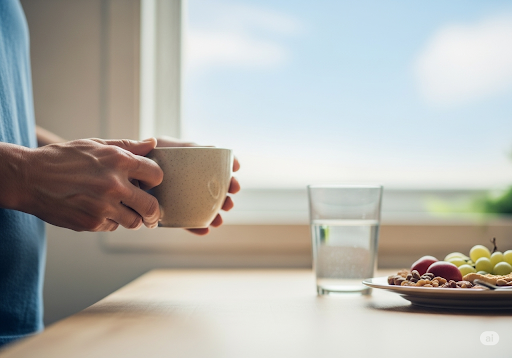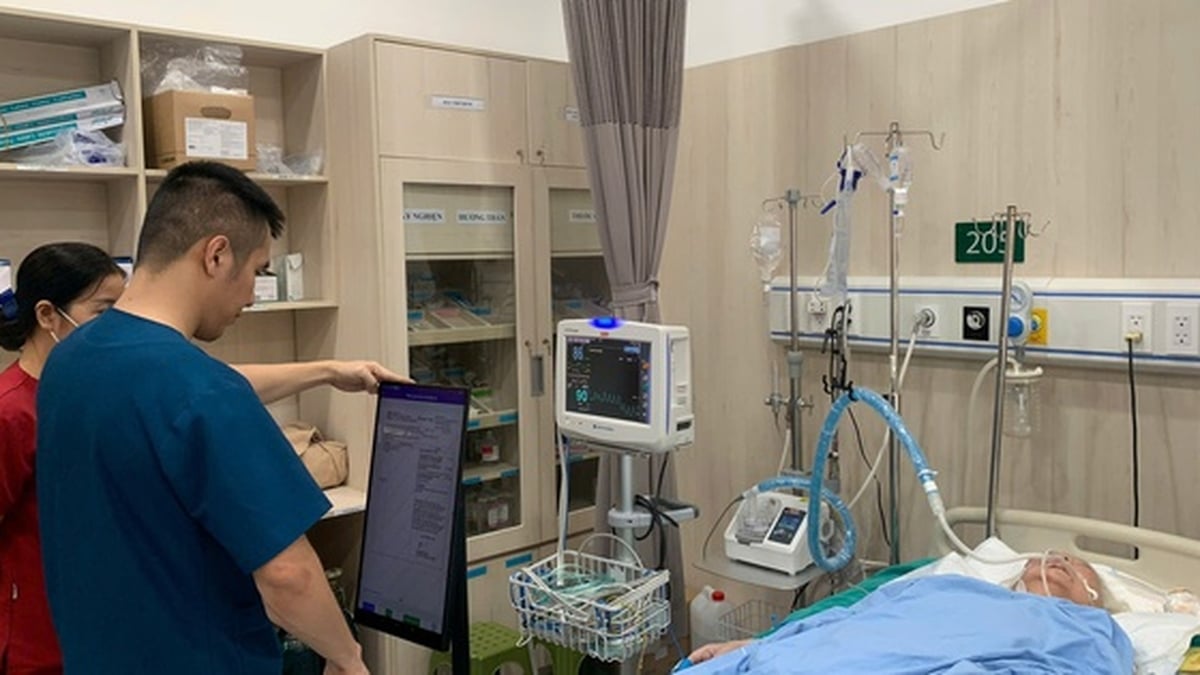Specialist Doctor 1 Nguyen Thu Ha, FPT Long Chau Pharmacy System, said that to achieve effectiveness and limit unwanted effects, you need to use green tea at the right time and frequency.
Do not drink tea during meals
Green tea contains many bioactive compounds such as catechins, flavonoids and organic acids, which are known for their antioxidant effects. However, if you drink tea right after a meal, these substances can bind with proteins and minerals such as non-heme iron in food, forming complexes that cause precipitation, causing bloating, indigestion and reducing the effectiveness of nutrient absorption.

Tea is good but don't drink tea with meals.
Photo: AI
Notably, the active ingredient Epigallocatechin gallate (EGCG) in tea has the ability to bind to non-heme iron in food. When iron absorption is hindered for a long time, your body will be tired, have reduced resistance and be at risk of anemia.
Do not drink strong tea
Dr. Thu Ha said that tea that is too strong contains a high amount of caffeine, which can stimulate the central nervous system, causing excitement, rapid heartbeat and difficulty sleeping, especially if you drink a lot in the evening. For people who are sensitive to caffeine, these reactions are often more obvious, affecting sleep and daily activities.
Maintaining the habit of drinking strong tea for a long time can lead to digestive disorders, restlessness, anxiety and decreased ability to concentrate. Especially for people with cardiovascular disease, high blood pressure or stomach problems, strong tea can make these conditions worse.
Therefore, to stay relaxed and regulate your circadian rhythm, you should brew tea in moderation and avoid drinking strong tea late in the day.
Do not drink green tea on an empty stomach
Drinking tea on an empty stomach can dilute gastric juices, impairing digestive function. In the long run, this habit can easily damage the lining, leading to ulcers or stomach pain. In particular, astringent compounds in tea such as tannins also stimulate the stomach to secrete more acid, making people with a history of stomach pain more likely to have recurring pain.

If you drink tea on an empty stomach, it can dilute gastric juices, causing digestive function to decline.
Photo: AI
In addition, drinking tea on an empty stomach also reduces the ability to absorb nutrients. The acid from tea can hinder the digestive process, making it difficult for the body to absorb vitamins and minerals. Therefore, you should drink tea after a light meal or for better digestion.
Do not soak tea leaves for too long.
Some people believe that steeping tea for a longer period of time will enhance the flavor and increase the amount of nutrients. However, this can cause the tea to lose its natural flavor and reduce its nutritional effectiveness. When steeped for too long, the tea becomes bitter and the beneficial compounds in the tea are easily broken down over time. This directly affects the tea-drinking experience and its original nutritional value. For best results, you should steep green tea for about 5 minutes, black tea for 5-10 minutes, and white tea for about 15 minutes.
People who should not drink green tea
To ensure health safety, some people need to limit or avoid using green tea. Below are groups of people who need to pay attention when drinking this drink:
People with stomach pain, cardiovascular disease, iron deficiency anemia, physical weakness, thyroid disorders, weak liver. Patients taking blood pressure, cardiovascular disease, antipsychotic drugs because green tea can interact with the drug, reducing effectiveness or causing side effects. People with blood clotting disorders should be careful, because vitamin K in tea can affect the effect of anticoagulants. Pregnant women and children should also not drink green tea, to avoid affecting sleep, the digestive system and the ability to absorb nutrients.
Doctor Thu Ha recommends that to maximize the benefits of green tea, it is necessary to pay attention to the "4 no's" when drinking to avoid harming your health. Using green tea properly and at the right time will contribute to supporting sustainable health and long-term effectiveness.
Source: https://thanhnien.vn/4-khong-khi-uong-nuoc-tra-xanh-tranh-gay-hai-cho-suc-khoe-185250524173752832.htm























![[Photo] National Assembly Chairman Tran Thanh Man visits Vietnamese Heroic Mother Ta Thi Tran](https://vphoto.vietnam.vn/thumb/1200x675/vietnam/resource/IMAGE/2025/7/20/765c0bd057dd44ad83ab89fe0255b783)











































































Comment (0)